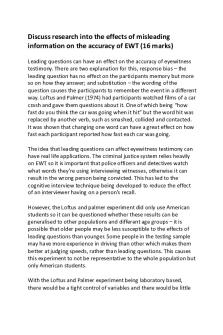Evaluation of the effects of institutionalisation PDF

| Title | Evaluation of the effects of institutionalisation |
|---|---|
| Course | Clinical Psychology |
| Institution | Anglia Ruskin University |
| Pages | 1 |
| File Size | 30.8 KB |
| File Type | |
| Total Downloads | 95 |
| Total Views | 188 |
Summary
practise...
Description
Evaluation of the effects of institutionalisation 1) Individual differences 2) Real-life application – There was an improvement in the way children placed in care were cared for. Rutter et al’s study emphasizes the importance of early adoption. In the past, mothers who were going to give a baby up for adoption were encouraged to look after the child for a certain period of time. However this was a problem, because by the time the child was adopted, the sensitive period would have passed, making it difficult for the child to form a secure attachment with its new care giver. Today, most babies are adopted within the first week of birth (so that they do not miss the sensitive period). 3) Problems with longitudinal studies – They take a long time (a lot of planning & waiting on results). 4) Deprivation is only one factor – The Romanian orphans faced more than just emotional development. The physical conditions they were living in were also appalling and impacted their health. Therefore it is likely that damage only occurs when there are multiple risk factors. 5) Institutionalisation may just be slow development – A criticism is that the effects of institutionalisation are irreversible. However this is not always the case, whereby a lower number of children who had disinhibited attachment were able to recover from the effects of it, provided they were given good quality care by their caregiver....
Similar Free PDFs

THE EFFECTS OF CORRUPTION
- 5 Pages

Effects of the Sugar REvolution
- 4 Pages

The Evaluation of Wal-Mart
- 3 Pages

Environmental Effects OF Quarrying
- 18 Pages

2... Effects OF Privation
- 2 Pages

Evaluation of Henry Fayol
- 4 Pages

Evaluation of counselling
- 6 Pages
Popular Institutions
- Tinajero National High School - Annex
- Politeknik Caltex Riau
- Yokohama City University
- SGT University
- University of Al-Qadisiyah
- Divine Word College of Vigan
- Techniek College Rotterdam
- Universidade de Santiago
- Universiti Teknologi MARA Cawangan Johor Kampus Pasir Gudang
- Poltekkes Kemenkes Yogyakarta
- Baguio City National High School
- Colegio san marcos
- preparatoria uno
- Centro de Bachillerato Tecnológico Industrial y de Servicios No. 107
- Dalian Maritime University
- Quang Trung Secondary School
- Colegio Tecnológico en Informática
- Corporación Regional de Educación Superior
- Grupo CEDVA
- Dar Al Uloom University
- Centro de Estudios Preuniversitarios de la Universidad Nacional de Ingeniería
- 上智大学
- Aakash International School, Nuna Majara
- San Felipe Neri Catholic School
- Kang Chiao International School - New Taipei City
- Misamis Occidental National High School
- Institución Educativa Escuela Normal Juan Ladrilleros
- Kolehiyo ng Pantukan
- Batanes State College
- Instituto Continental
- Sekolah Menengah Kejuruan Kesehatan Kaltara (Tarakan)
- Colegio de La Inmaculada Concepcion - Cebu








